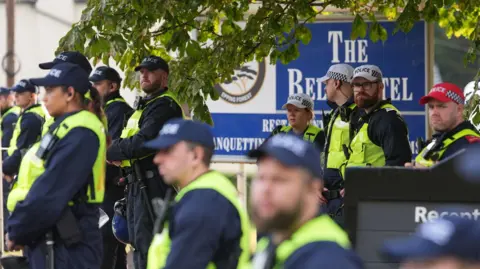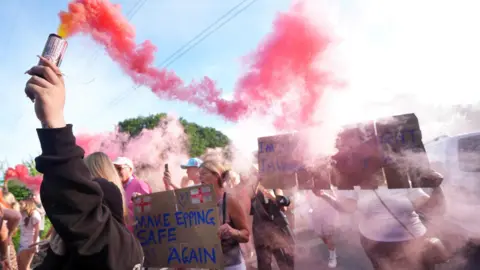Lewis AdamsBBC News, Essex
 PA Media
PA MediaA temporary injunction that blocked asylum seekers being housed at an Essex hotel has been overturned at the Court of Appeal.
Lawyers for The Bell Hotel in Epping and the government challenged a High Court ruling that would have forced 138 asylum seekers to leave the site by 12 September.
Overturning the injunction, Lord Justice Bean said the High Court ruling was “seriously flawed in principle”.
Epping Forest District Council, which obtained the initial injunction, said “the battle was not over”.
The Home Office has braced itself for a wave of legal challenges from other councils over the use of hotels in their areas, fearing Epping’s victory would set a precedent.
But Lord Justice Bean said the High Court ruling by Mr Justice Eyre failed to consider the challenges of relocating the migrants.
“The judge’s approach ignores the obvious consequence that the closure of one site means capacity needs to be identified elsewhere in the system,” he said, reading the ruling made by him and two other Court of Appeal judges.
Reacting to the latest ruling, Conservative leader Kemi Badenoch said it “puts the rights of illegal immigrants above the rights of the British people”.
A full High Court hearing to decide on an injunction for the Bell is expected in mid-October.
 PA Media
PA MediaThousands of people have attended anti-immigration protests and counter-demonstrations outside The Bell Hotel since July.
It followed an asylum seeker housed there being arrested and subsequently charged with several offences including the sexually assault of a 14-year-old girl.
Hadush Kebatu, who is from Ethiopia, denies the offences and has been on trial.
The protests acted as a trigger for the council to apply for an injunction, its legal team said in court.
Lord Justice Bean said this was “worrying”, adding: “If an outbreak of protest enhances a case, this runs the risk of acting as an impetus for further protests – some of which may be disorderly – around asylum accommodation.
“There is a risk of encouraging further lawlessness.”
Police say 25 arrests have been made in connection with disorder outside the hotel, with 16 people charged.
Lord Justice Bean said Mr Justice Eyre “made a number of errors” when imposing the injunction on 19 August.
Criticism was also levelled at the High Court judge’s refusal to allow Home Secretary Yvette Cooper’s 11th-hour attempt to dismiss the council’s case.
That would have given him more insight into the challenge of relocating the asylum seekers, Lord Justice Bean added.
 PA Media
PA MediaAt the High Court, Epping Forest District Council had claimed the using the Bell as asylum accommodation breached planning rules.
“The battle is not over and we will continue the fight,” a spokesperson said earlier.
“It is nothing less than the people of Epping would expect and deserve.”
Nick Beales, of the Refugee and Migrant Forum Of Essex & London, told BBC Radio 5 Live: “We support the closure of these hotels absolutely, what we don’t support is people turning up at these hotels and going out of their way to make the people housed inside them feel, at best, unwelcome, and at worst, physically threatened and unsafe.”
The judgement followed evidence being heard on Thursday.
Housing asylum seekers was described as a “lifeline” for the venue, which was only 1% full when it was open to paying customers in August 2022.
Becca Jones, the Home Office’s director of asylum support, added it would have been a blow to lose The Bell Hotel’s 152 beds when pressure was “significant and increasing”.
The hearing was told there were 103,684 accommodated asylum-seekers as of 31 March, higher than in 2024.
Philip Coppel KC, acting for the district council, argued there was “no compelling reason” for the appeal bid to be allowed.

